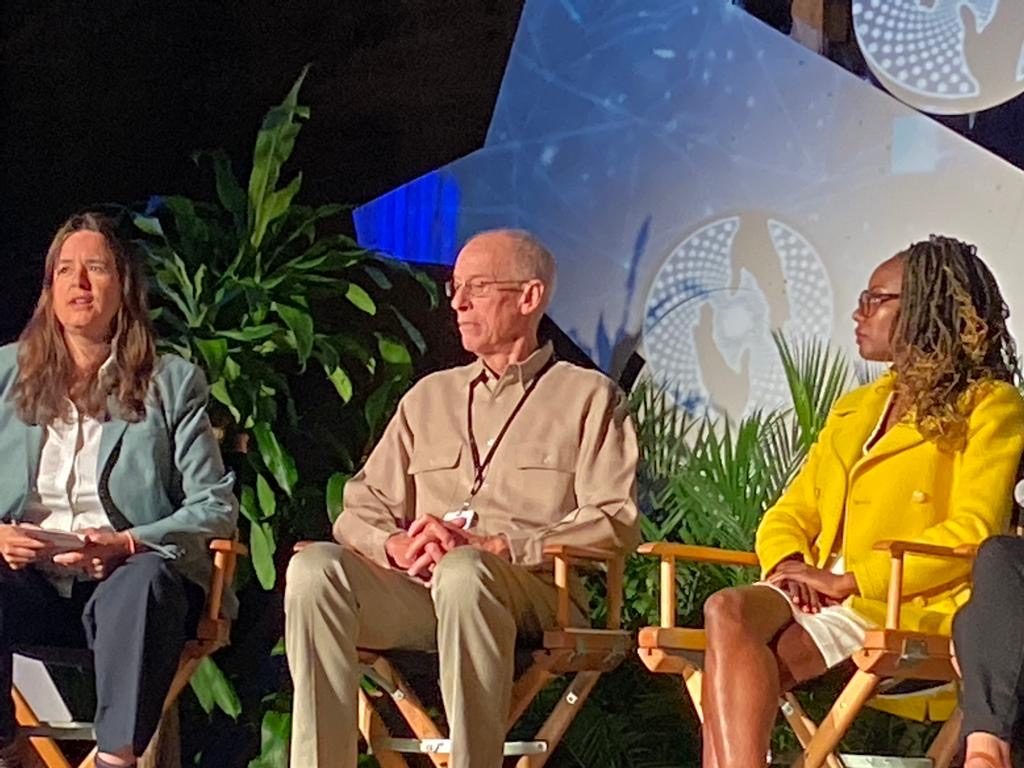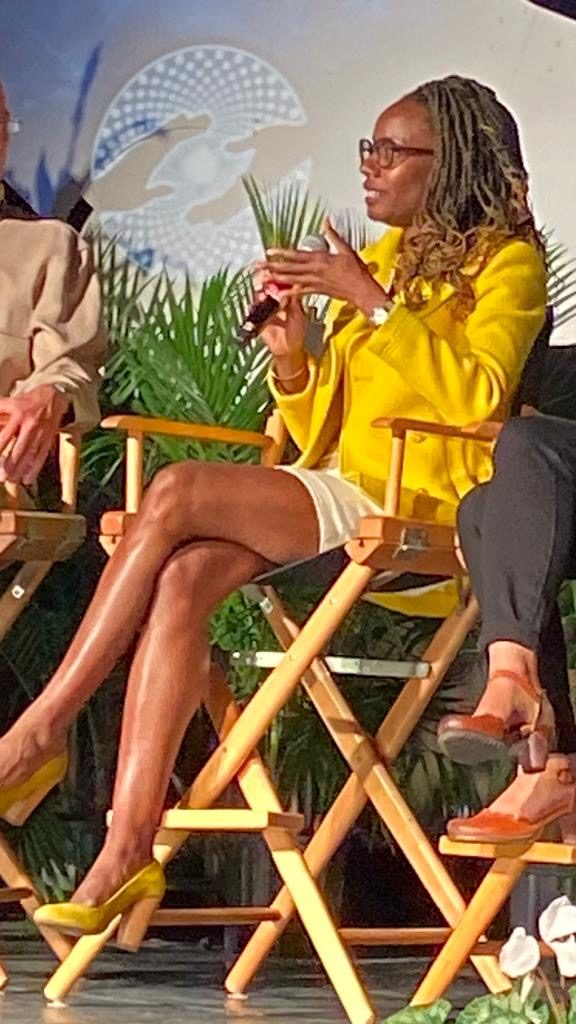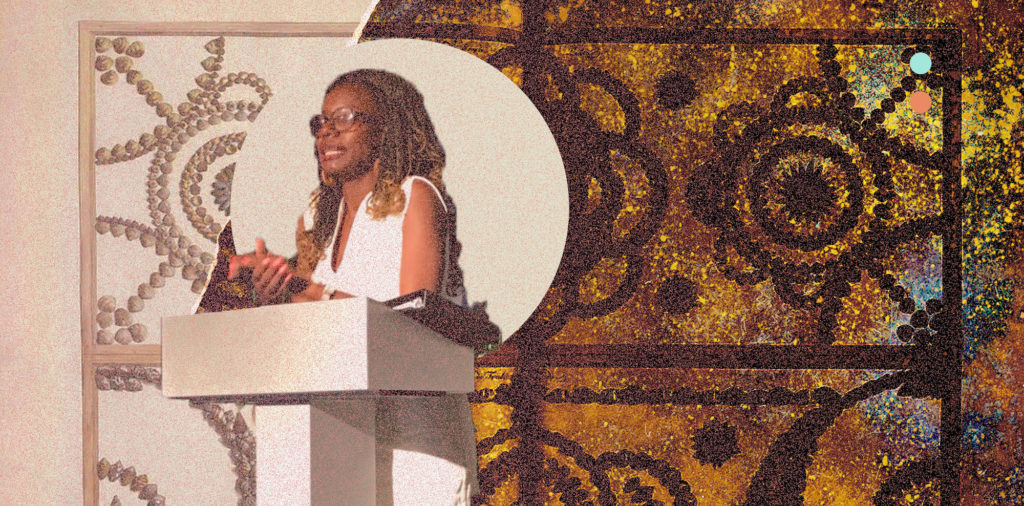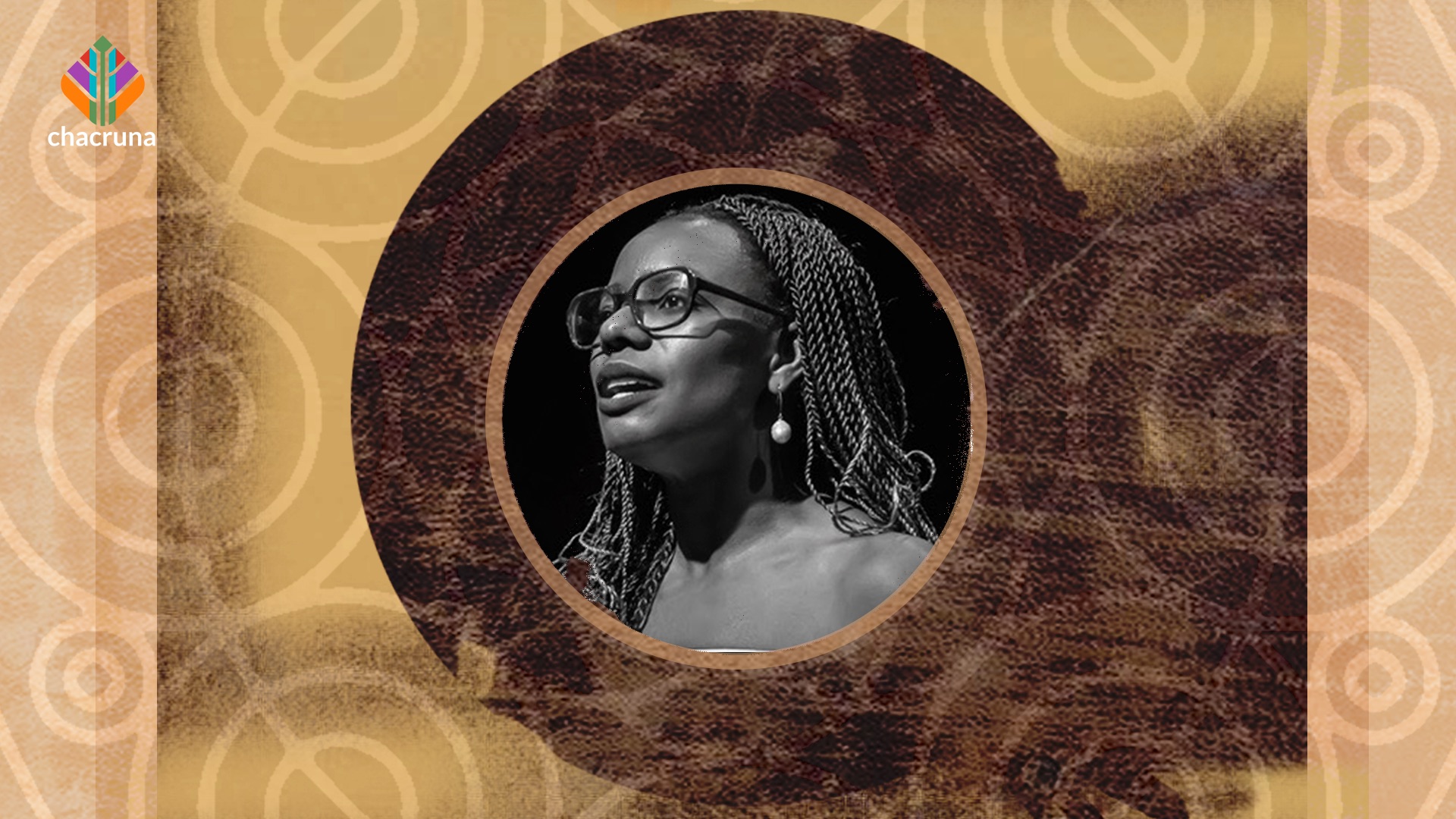Dr. Mellody Hayes was told she would never go to Harvard, because people from the inner-city high school she attended didn’t go there. But Harvard is where Dr. Hayes wanted to go, so Harvard is where she went. After earning a B.A. in sociology, she continued to medical school at UCSF. Now, Dr. Hayes is an anesthesiologist at Empire Anesthesia, focusing on palliative and end-of-life care.
However, Dr. Hayes’ vision of wellness extends far beyond the hospital. In a powerful and impassioned speech at the recent Psychedelic Science Summit, held in Austin, TX, Dr. Hayes spoke to psychedelics’ potential to help people awaken to their power—a power of love, peace and joy from which to author new narratives for themselves and for society. She provides a powerful voice for the psychedelic movement that speaks toward and on behalf of all perspectives, including those the movement has yet to adequately represent.

SL: How have you come to see psychedelics as medicine?
MH: I’ve been reading research for some time about psychedelic use in palliative and end-of-life-care, as well as anxiety and depression. When I went through my own experience of depression, I decided to undergo treatment with ketamine. That was a profoundly opening experience. It expanded my understanding of options for treating suffering, opening me to new narratives of understanding emotional distress.
The biomedical model leaves out so much in terms of social, economic, and spiritual distress; therefore, many aren’t achieving the relief they need. Understanding our lost connections and social isolation is really important for getting past the underlying causes of our disease.
We’re fundamentally social creatures, and our isolation and economic inequality is creating our distress. Part of why psychedelics are such a useful model is that they foster a desire to be in relationship. That is the fundamental medicine.
One thing the scientific community needs to include in discussions on psychedelics is how to bring this healing message to all people. History shows it can take 20 years for a novel treatment to reach marginalized communities. How can we include people of color, women, and queer people in the wave of benefit while we still believe there’s magic in the medicine?
People call psychedelics mind-manifesting medication. What does it mean when everyone has the possibility to manifest happiness, peace, and joy? To experience transcendence, separate from their narratives of suffering?
My treatment with ketamine pushed a mute button on the stories of suffering, and I experienced peace. It’s more powerful to create from a place of peace, hope, and joy than from distraction, sadness, and isolation.
SSRIs can numb depression and anxiety, whereas psychedelics can give people that experience of love and peace. With that experience, people can pattern new mental maps; without it, you don’t know what to create from.
“How can I choose every day to incline myself more toward peace, love, and joy?” That’s how I heal my mind. That’s how I create new circuits in my thinking.
If you believe in the law of attraction—“as within, so without”—then, as I become more peace, love, and joy, I attract more peace, love, and joy. As I release aggression, the world becomes less aggressive to me. As I show more generosity, the world is more generous to me.
I trained as an anesthesiologist. I’m passionate about palliative care. But I’m primarily a spirit who believes that matters of love and faith are profoundly important. There will never be a pill or chemical that will give you all you need. We need hugs. We need laughter. We need to be in relationship, in community. We’ll never be healthy as we can be when we’re isolated. We need societies that are more just and inclusive. That’s part of our medicine.
SL: How do we create that?
A lot of things are profoundly societally-determined. Even the number of trees planted in a neighborhood is correlated with health outcomes and levels of violence. So, environment matters.
Let me describe one experimental environment. In the Forced Swim Test for rats, you throw them in water, make it impossible for them not to experience drowning, and they predictably develop a pattern of learned helplessness. You create the experimental circumstances for the outcomes. Others are living in Rat Park, an enriched environment that makes addiction less likely. It’s funny that people look at outcomes as unpredictable, because these trends are somewhat predictable.
With psychedelics, set and setting are important to produce the experience. We’re not all living in the same set and setting. The social violence in this set and setting is producing the psychosis and distress some are experiencing.
SL: You’re speaking about experiencing peace and joy, then from that, creating narratives that, through the law of attraction, reflect outward and facilitate healing. In my position of privilege, that feels easy to align with. But I think of someone having this experience and returning to a set and setting of oppression. How can that person avoid getting sucked back into the way life has been?
MH: This perspective frequently comes up: “You wake someone up, then send them back into chaos.” Well, you wake up and go back into white supremacy. Does that bother you? Isn’t that the same analogy? I would like you to question the lens of privilege of your life, the ease that you’re living in. You take it as peace, but is it really as without conflict as you’re saying?
There’s something fundamentally classist about this idea that treatment with the medicine of love wouldn’t work the same in economically-disadvantaged communities. Why wouldn’t love and mindfulness work the same? Think of examples like Martin Luther King and Gandhi: No person of color who has become a leader has woken up in peace. They’ve lived in communities affected by violence, and they’ve woken up and started doing the work there.
SL: Like Harriet Tubman, as you spoke of in your talk.
MH: Exactly. So why would waking someone up exactly where they’re living ever be problematic? Why start with the assumption that an experience of love, peace, and power wouldn’t be an effective medicine for all people?
SL: It’s not that it wouldn’t be an effective medicine, but that more cards are stacked against some people.
MH: That’s true. But you wake up into reality and decide to play your hand. If you’re going to be a liberal social justice activist, you cannot hold people to the story of oppression as though that is the only outcome that will ever be.
We’re in this conversation because we’re ready to create new narratives for one another. I don’t expect you to behave according to what your ancestors might have done, and I don’t expect you to expect me—or communities that look like me—to persist in poverty. While it’s useful to understand the steeper climb for people who have existed in oppression, an elevation in consciousness must occur so that we no longer imbibe the stories that predict us to be victims. I rejected that projection, or else it would have become a self-fulfilling prophecy.
Most people look at the world and describe it as it is. Leaders describe the world as it will be. To be a part of social justice work, of shaping new narratives about healthcare, it’s important to know where we stand, but more important to keep our eye on what we’re going to create. I’m going to create a track—through empowerment, through clinical medicine, through narrative—where people who once felt their only option was disenfranchisement can realize there’s a path to empowerment, peace, and joy.
SL: It starts in the heart?
MH: It starts everywhere. We have to believe things can change, because then we’ll act to create change. This “everything-is-messed-up”narrative can overwhelm people, so they palliate instead of curing the system. To really decide you want to empower, you have to believe at the highest level that a fundamentally different outcome is possible.
My vision is that we’re going to increase our will for physical safety for black men and women. I stand for that because, if I were to be in my despair about these issues, then I would be lost.
Pain pulls you back to the past. Love, peace, and joy give you a visionary calling that helps you create a new outcome. My knowledge of what we can create is much more empowering than paying attention to past chaos and violence we’ve experienced.
There’s a Martin Luther King quote that says, “I’m going to stick with love, because hate is too heavy of a burden.”If I stay in a place of outrage about where people are in their development, I couldn’t engage and say, “That’s where you are. How do I get you where you need to be?”
I’mnot going to get you where youneed to be, because I have to do my own work. But I can encourage you to get yourself where you need to be, because I can’t keep doing this remedial lesson.
SL: It’s not your responsibility.
MH: Right. Your awakening into social responsibility is your job.
I’ve seen many social justice warriors get sick. They’re so in the fight that it takes them out of the game, because they’re overwhelmed by depression and anger. It can progress into a fixed state of vulnerability of a victim mentality, which is dangerous and isolating.
Although these social realities that marginalized communities live in are real, they’re not our only story. If that’s the only story you live in, and you don’t live in your ability to love and receive love, you’ll get sick. But there are ways to be engaged without getting sick in the fight.
Anger is a message about boundaries. It’s pure energy. So, it’s not the anger we communicate from, but the wisdom of the anger. I might think someone else deserves anger, but I don’t deserve to feel it. I allow the empowerment of my self-knowledge and the wise anger to influence the diligence in which I pursue becoming more bountiful, so that I can hold anger and still contain peace, love, and joy.

SL: Your vision of empowerment isn’t the vision of separation and distraction the media promotes. How does one weed through this indoctrinated narrative and stay true to the vision?
MH: You have to focus your attention on what you want to create, not the messages of distraction. There were white people and black people telling King, “things will never change.” History shows when you’re creating what you want to create, people say it’s impossible. To them, I say, “I’m not going to pay attention to what you’re saying, because I see with the clarity of my internal vision. I know you can’t see it, but I’m going to walk in this direction, and I’m going to carry you with me.”
There’s a narrow door and a blade-thin path to the world you want to create. While you’re walking the path, people will say, “There’s not even a path there. What are you following?”You have to keep walking it, ignoring the maya of this world saying you can’t be, do, and have all you’re called to be, do, and have.
When I was in high school, my goal was to go to Harvard. Although I was at an inner-city high school in the “hood,” I told everyone I was going to go to Harvard. My guidance counselor had no faith in me, because she looked where everyone else ended up. I was looking at where I was going to end up. And I got there.
It doesn’t matter that some people don’t believe in my vision, because I decide what tomorrow will be. I’m going to bring people to my vision not because of my outrage, but because of my confidence, and the abundance we can have.
SL: I saw that in action. Just a few days ago, you received continuous applause through your speech. Your vision is so broad and inclusive that it spoke to everyone.
MH: Thank you. So, the opportunity is to move this from discussion to action. What choices are we going to make?
I applaud you for the choice you’ve made. I’m going to bless you and say, “May every door be open, that you may amplify the willingness to look at white fragility, the willingness to create a new reality.”Because, as you soften, you take responsibility for the shadow, the blind spots to the suffering of others.
There’s a great quote I read that privilege means being able to turn away from the suffering of others. When your heart opens, you feel the suffering of others more deeply, a willingness to keep your heart tender and available to a cause higher than yourself.
SL: And you find psychedelics can help facilitate that?
MH: I find that a spiritual practice is very important. I’m not an advocate for psychedelics per se. I’m an advocate for waking up and taking responsibility for your life. For some people, that will be through psychedelics. But there’s a hazard we should talk about with psychedelics, where people feel good but may not do the work to change their lives and change the world.

SL: Spiritual bypassing, as I’ve heard it called.
MH: The vision is to make a U.S. that’s not organized by race; a U.S. where all people have all possibilities of ending up in all destinations. That means our boardrooms look like America. That means our prisons look like America. The stories you have and expect for me are the same as the stories I have and expect for you. We can create that society.
In popular media, there have been many presentations of people of color being exposed to psychedelics. This isn’t a niche area anymore. There have been several NPR interviews, several publications in major medical journals. This is contemporary, mainstream medicine.
SL: It’s not something you need to tiptoe around in medical communities anymore?
MH: There’s a culture within medicine where people don’t talk about their suffering. So, talking about my experience with depression is bold of me. However, rates of depression and anxiety are rampant within this profession. My choice to speak publicly about my experience with depression is my choice to be free and bold, to bring these things out of the shadow. It’s not going to get better when we keep pretending we’re not in pain.
If we want to shift our discussion about what it means to be human and create more inclusion, people should be able to talk about their anxiety and depression with the same compassion given someone diagnosed with cancer or congestive heart failure. You don’t shame someone for having a heart that’s overloaded from too much fluid. But for people with anxiety or depression, whose hearts and nervous systems are literally overloaded—we associate that state with shame.
I’ve got no shame in my game. I love myself, and I love who I’ve become by embracing all parts of myself, the shadow and the light. I share my own story because stories are medicine. Sharing stories is the most important thing we can do to get us from isolation into community, stories about the way life actually is. Everyone’s in a Hollywood/Disney version of reality, and that’s not what it looks like. Sometimes life is really painful and messy.
SL: And people feel something’s wrong with them when their experience doesn’t match that narrative.
MH: Exactly. To have people be public and messy and real says, “I’m not alone in this? You have feelings? You want love, too? You hurt, too?”That’s healing.
SL: You noted a lack of diversity at the conference. How can we create more inclusion in the psychedelic community?
MH: To create the inclusive community that represents America, every conference has to plan that from the start in terms of attendees, speakers, and everyone in the organization. That means going to colleges and contacting their Black, Latino, and Native American student associations and giving free tickets for college students to attend.
The vision for clinics would be a sliding scale model, so all people could benefit from these medicines. It’s also important these clinics are available in rural areas. Psychedelics are primarily a conversation in urban centers, but rural areas are profoundly affected by depression, isolation, alcoholism, meth addiction, etc.
How do we train therapists from all cultural backgrounds so they can sit and hold space for others? This is a continuation for the need for diversity in medical training at all levels—therapists, psychologists, physicians. We need people from all backgrounds, because your story has a message that heals me, and my story has a message that heals you. We need people who carry all stories inside them, so we witness each other’s stories without turning away; instead, holding space for one another.
There’s a crisis of social connection in America. I don’t believe a pill or psychedelic needs to reach everyone, but the message that we need to connect and the impetus to connect does. For people who have lost their way from their knowledge of how to live in authentic connection, an experience with psychedelics could be transformative.
Take a minute to browse our stock:
Did you enjoy reading this article?
Please support Chacruna's work by donating to us. We are an independent organization and we offer free education and advocacy for psychedelic plant medicines. We are a team of dedicated volunteers!
Can you help Chacruna advance cultural understanding around these substances?
















